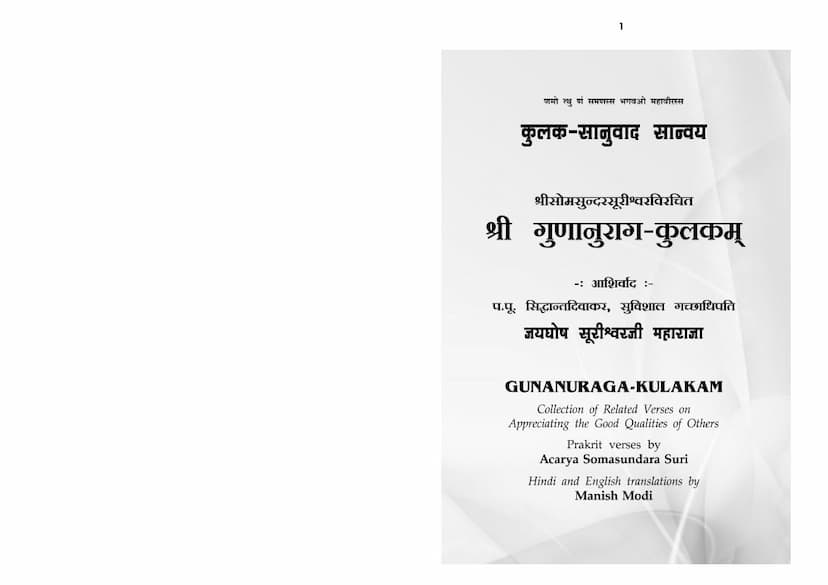Gunanurag Kulakam
Added to library: September 1, 2025

Summary
Here's a comprehensive summary of the Jain text "Gunanurag Kulakam" by Acarya Somasundara Suri, with translations by Manish Modi:
Book Title: Gunanurag Kulakam (Collection of Related Verses on Appreciating the Good Qualities of Others) Author: Acarya Somasundara Suri Translators: Manish Modi (Hindi and English) Publisher: Divya Darshan Trust
Core Message:
The "Gunanurag Kulakam" is a profound Jain scripture that emphasizes the paramount importance of appreciating and imbibing the good qualities of others (गुणानुराग - Gunanurag). It argues that this practice is not merely a virtuous act but a fundamental path to personal growth, spiritual advancement, and ultimate liberation. The text contrasts this with the detrimental effects of envy and fault-finding.
Key Themes and Teachings:
-
The Power of Appreciation: The text begins by highlighting the transformative power of appreciating the good qualities of others. It suggests that this practice can lead to immense personal progress, even to the attainment of the highest spiritual states (like Tirthankar-hood, as mentioned in verse 2).
-
The Detrimental Nature of Envy and Fault-Finding: Conversely, the verses strongly condemn envy (ईर्ष्या - Irshya) and the habit of finding fault in others (परनिन्दा - Paraninda). These negative traits are depicted as leading to defeat, endless wandering in the cycle of birth and death (samsara), and diminishing one's own virtues in the eyes of wise individuals.
-
Gunanurag as a Path to Happiness and Liberation: The collection asserts that the ability to appreciate good qualities is the "abode of all happiness" (verse 4). It is presented as a more effective means to spiritual progress than mere extensive study, penance, or charity if Gunanurag is absent.
-
Internalizing Virtues: The text explains that by focusing on and appreciating the virtues of others, one gradually internalizes those very qualities. This broadens one's perspective and elevates their thought process from a personal level to a universal one.
-
Overcoming Negative Passions: The verses suggest that the best way to destroy inner vices like anger, pride, delusion, greed, and envy is through the praise of others' virtues (पर-गुण स्तुति - Par-gun Stuti). This practice helps to awaken similar virtues within oneself.
-
Classification of Praiseworthy People: The "Gunanurag Kulakam" outlines four categories of people who are praiseworthy in the world:
- Supremely Excellent (सर्वोत्तमोत्तम - Sarvottamottam): Those who, even amidst temptations and beauty, maintain strict adherence to vows (like celibacy) through mind, speech, and action.
- Excellent (उत्तमोत्तम - Uttamottam): Those who may experience momentary attachments but quickly repent and rectify their mistakes, actively seeking atonement.
- Good (उत्तम - Uttam): Those who may be attracted to beauty but refrain from immoral conduct, even when opportunities arise, and remain faithful to their spouses (in the case of laypeople).
- Average (मध्यम - Madhyam): Those who make consistent efforts in the pursuit of Dharma (piety), Artha (wealth), Kama (pleasure), and Moksha (liberation).
-
Compassion and Discernment: The text advises showing compassion to all beings, even those who are "depraved and supremely depraved" (verse 14). It also cautions against criticizing or praising monks publicly if their conduct is lax, instead advocating for compassion and the subtle guidance towards the right path (verses 23-24).
-
Appreciating Even Small Virtues: In the current difficult times ("dusama samaya" - verse 25), it is crucial to respect and honor even the slightest trace of virtue found in anyone.
-
Cross-Lineage Appreciation: A significant teaching (verse 26) encourages appreciating the good qualities of monks regardless of their ascetic lineage (gaccha), emphasizing the transcendence of sectarian differences in the pursuit of virtue.
-
Attaining Qualities in Future Lives: The book states that sincerely admiring the good qualities of virtuous individuals can lead to the attainment of those same qualities in future lives (verse 27).
-
Liberation as the Ultimate Goal: Ultimately, the practice of Gunanurag is presented as the direct path to achieving liberation and a state of luminous beauty and peace (somasundara state) which is universally praised (verse 28).
Overall Significance:
"Gunanurag Kulakam" serves as a practical guide for spiritual seekers within the Jain tradition, offering a clear and compelling argument for cultivating a positive and appreciative outlook towards the virtues of all beings. It emphasizes that true spiritual progress is not just about personal austerity but also about fostering goodwill and recognizing the inherent goodness in others, thereby purifying one's own consciousness and moving closer to liberation. The translations by Manish Modi make these ancient teachings accessible to a wider audience.